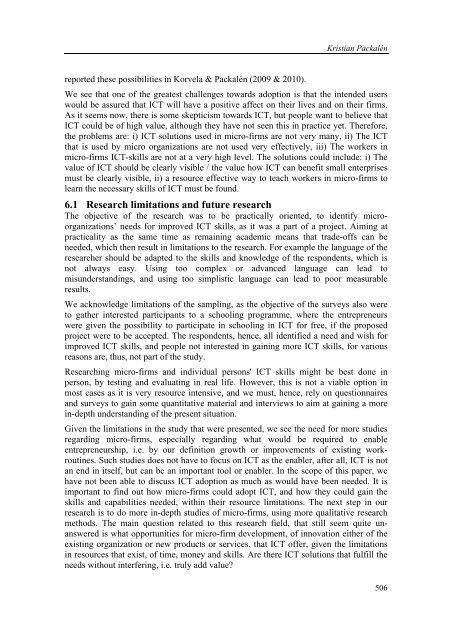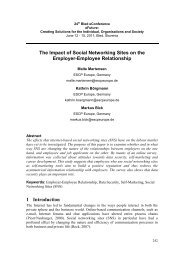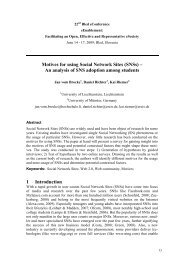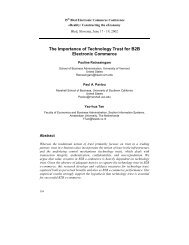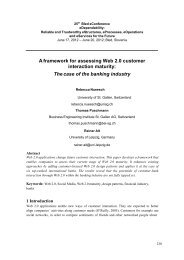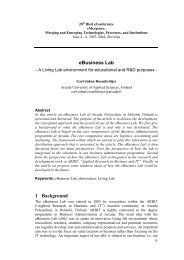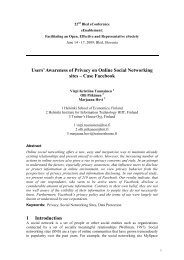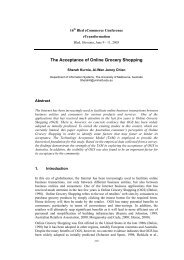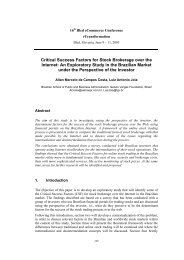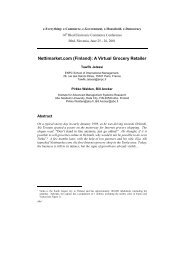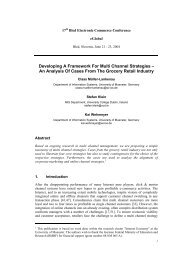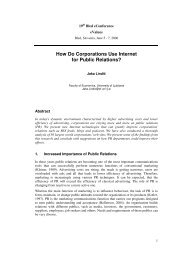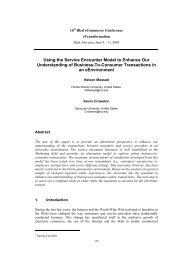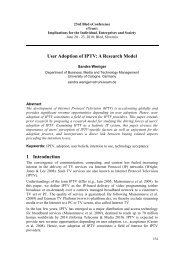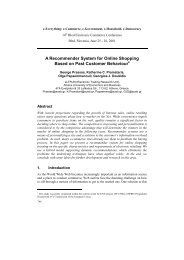ICT Capabilities and Possibilities in Micro-firms: 1 Background
ICT Capabilities and Possibilities in Micro-firms: 1 Background
ICT Capabilities and Possibilities in Micro-firms: 1 Background
You also want an ePaper? Increase the reach of your titles
YUMPU automatically turns print PDFs into web optimized ePapers that Google loves.
Kristian Packalén<br />
reported these possibilities <strong>in</strong> Korvela & Packalén (2009 & 2010).<br />
We see that one of the greatest challenges towards adoption is that the <strong>in</strong>tended users<br />
would be assured that <strong>ICT</strong> will have a positive affect on their lives <strong>and</strong> on their <strong>firms</strong>.<br />
As it seems now, there is some skepticism towards <strong>ICT</strong>, but people want to believe that<br />
<strong>ICT</strong> could be of high value, although they have not seen this <strong>in</strong> practice yet. Therefore,<br />
the problems are: i) <strong>ICT</strong> solutions used <strong>in</strong> micro-<strong>firms</strong> are not very many, ii) The <strong>ICT</strong><br />
that is used by micro organizations are not used very effectively, iii) The workers <strong>in</strong><br />
micro-<strong>firms</strong> <strong>ICT</strong>-skills are not at a very high level. The solutions could <strong>in</strong>clude: i) The<br />
value of <strong>ICT</strong> should be clearly visible / the value how <strong>ICT</strong> can benefit small enterprises<br />
must be clearly visible, ii) a resource effective way to teach workers <strong>in</strong> micro-<strong>firms</strong> to<br />
learn the necessary skills of <strong>ICT</strong> must be found.<br />
6.1 Research limitations <strong>and</strong> future research<br />
The objective of the research was to be practically oriented, to identify microorganizations’<br />
needs for improved <strong>ICT</strong> skills, as it was a part of a project. Aim<strong>in</strong>g at<br />
practicality as the same time as rema<strong>in</strong><strong>in</strong>g academic means that trade-offs can be<br />
needed, which then result <strong>in</strong> limitations to the research. For example the language of the<br />
researcher should be adapted to the skills <strong>and</strong> knowledge of the respondents, which is<br />
not always easy. Us<strong>in</strong>g too complex or advanced language can lead to<br />
misunderst<strong>and</strong><strong>in</strong>gs, <strong>and</strong> us<strong>in</strong>g too simplistic language can lead to poor measurable<br />
results.<br />
We acknowledge limitations of the sampl<strong>in</strong>g, as the objective of the surveys also were<br />
to gather <strong>in</strong>terested participants to a school<strong>in</strong>g programme, where the entrepreneurs<br />
were given the possibility to participate <strong>in</strong> school<strong>in</strong>g <strong>in</strong> <strong>ICT</strong> for free, if the proposed<br />
project were to be accepted. The respondents, hence, all identified a need <strong>and</strong> wish for<br />
improved <strong>ICT</strong> skills, <strong>and</strong> people not <strong>in</strong>terested <strong>in</strong> ga<strong>in</strong><strong>in</strong>g more <strong>ICT</strong> skills, for various<br />
reasons are, thus, not part of the study.<br />
Research<strong>in</strong>g micro-<strong>firms</strong> <strong>and</strong> <strong>in</strong>dividual persons' <strong>ICT</strong> skills might be best done <strong>in</strong><br />
person, by test<strong>in</strong>g <strong>and</strong> evaluat<strong>in</strong>g <strong>in</strong> real life. However, this is not a viable option <strong>in</strong><br />
most cases as it is very resource <strong>in</strong>tensive, <strong>and</strong> we must, hence, rely on questionnaires<br />
<strong>and</strong> surveys to ga<strong>in</strong> some quantitative material <strong>and</strong> <strong>in</strong>terviews to aim at ga<strong>in</strong><strong>in</strong>g a more<br />
<strong>in</strong>-depth underst<strong>and</strong><strong>in</strong>g of the present situation.<br />
Given the limitations <strong>in</strong> the study that were presented, we see the need for more studies<br />
regard<strong>in</strong>g micro-<strong>firms</strong>, especially regard<strong>in</strong>g what would be required to enable<br />
entrepreneurship, i.e. by our def<strong>in</strong>ition growth or improvements of exist<strong>in</strong>g workrout<strong>in</strong>es.<br />
Such studies does not have to focus on <strong>ICT</strong> as the enabler, after all, <strong>ICT</strong> is not<br />
an end <strong>in</strong> itself, but can be an important tool or enabler. In the scope of this paper, we<br />
have not been able to discuss <strong>ICT</strong> adoption as much as would have been needed. It is<br />
important to f<strong>in</strong>d out how micro-<strong>firms</strong> could adopt <strong>ICT</strong>, <strong>and</strong> how they could ga<strong>in</strong> the<br />
skills <strong>and</strong> capabilities needed, with<strong>in</strong> their resource limitations. The next step <strong>in</strong> our<br />
research is to do more <strong>in</strong>-depth studies of micro-<strong>firms</strong>, us<strong>in</strong>g more qualitative research<br />
methods. The ma<strong>in</strong> question related to this research field, that still seem quite unanswered<br />
is what opportunities for micro-firm development, of <strong>in</strong>novation either of the<br />
exist<strong>in</strong>g organization or new products or services, that <strong>ICT</strong> offer, given the limitations<br />
<strong>in</strong> resources that exist, of time, money <strong>and</strong> skills. Are there <strong>ICT</strong> solutions that fulfill the<br />
needs without <strong>in</strong>terfer<strong>in</strong>g, i.e. truly add value?<br />
506


